With another year almost over, the annual review of events in the three countries making up the South Caucasus can be considered surprisingly positive in comparison to previous years. 2007 ended with a state of emergency declared in Georgia after opposition street protests, for example, while 2008 saw one also declared in Armenia after 10 people were killed following a bitterly disputed presidential election. The year ended with the albeit short-lived Russia-Georgia war, and 2009 was marked by the imprisonment of two video blogging youth activists in Azerbaijan.
So, what did 2010 hold in store for the South Caucasus? Well, with the first deployment of new and social media in elections in the region, to the pioneering use of online tools in conflict resolution and cross-border cooperation and communication, as well as an especially positive story towards the end of the year, read on.
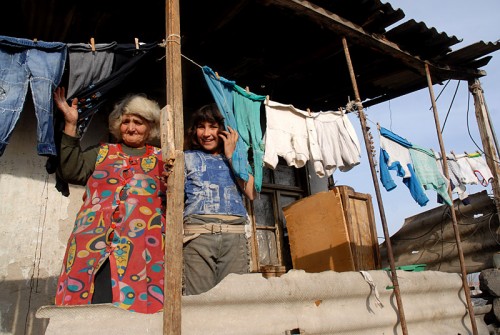
Ethnic Armenians in the village of Tsopi, Georgia, co-inhabited with ethnic Azeris © Onnik Krikorian
To begin with, the first post of 2010 on Armenian-Azeri coexistence in Georgia was also to set the main theme for the whole year, with many blog posts and analytical articles on the role new and social media could play in regional conflict resolution and transformation to follow. Both also formed the basis for participation on a panel and expert's working group at the U.S. Institute of Peace as well as a guest post for the World Development Report 2011.
Contacts formed in Armenia and Azerbaijan as a result of this work also saw Global Voices’ Caucasus editor engage in outreach to potential participants from Armenia and Azerbaijan for the region's first ever Social Innovation Camp held in Tbilisi, Georgia, in April. And, with local NGOs and international donors slowly starting to follow this lead, a special coverage page, Caucasus Conflict Voices, was launched and will continue throughout 2011.
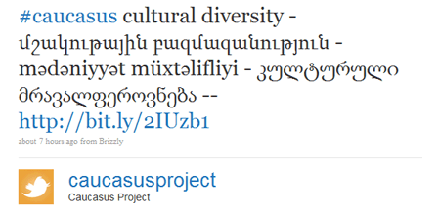
 Another interesting development in 2010, however, was the increasing use of new and social media for non-politicized purposes. As with LGBT issues in Armenia, one example of that could be found in the form of challenging some of the more taboo subjects in the region. In particular, this meant sex, not only in general, but particularly in Georgia.
Another interesting development in 2010, however, was the increasing use of new and social media for non-politicized purposes. As with LGBT issues in Armenia, one example of that could be found in the form of challenging some of the more taboo subjects in the region. In particular, this meant sex, not only in general, but particularly in Georgia.
Perhaps the most buzzing topic in the Georgian social media scene was not politics, elections, sport, crisis, earthquakes or catastrophe. Instead, one of the most discussed topics was actually about a new television show, Ghame Shorenastan. Shown on Imedi TV, the title translates as Night with Shorena and covers topics about sex.
Nevertheless, tragedy also struck in Georgia earlier this year when luger Nodar Kumaritashvili died in accident just hours before the opening of the 2010 Olympics in Vancouver, Canada. Twitter users commented on the incident, while a month later bloggers were critical of a fake news report which panicked a nation still recovering from its 2008 war with Russia.
On Saturday 13 March, the Imedi national television broadcaster aired a mock news report stating that Russian tanks had invaded Georgia and that the president was dead. Aired at 8pm, the usual time slot for daily news, the nation's most trusted broadcaster […] offered its audience the worst possible case scenario of what might happen a week after municipal elections scheduled for the end of May in the country's capital, Tbilisi.
Of course, with another Genocide resolution under consideration in the U.S. Congress, politics did briefly rear its head, but otherwise all three countries would soon be concentrated on something else — the 2010 Eurovision Song Contest in Oslo, Norway. Moreover, unlike previous years, the international music competition was largely held without any major scandals involving acts from the Caucasus.

True, politics were to materialize again soon after, but if in previous years that had been through largely politically polarized posts from government or opposition activists, the May local elections saw the serious deployment of both new and social media to monitor them.
[…] Considered another test of Georgia's fledgling democratization process, both deployed and relied on online and social media technologies to monitor the vote perhaps as never before during any other previous election held in the country or, indeed, the region.
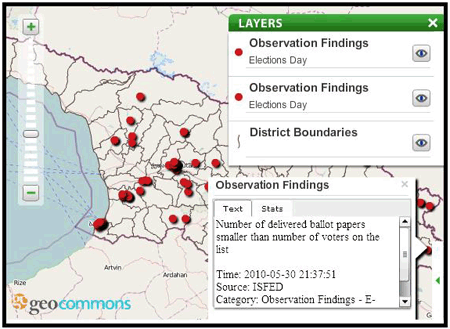
For much of the remaining part of the year, however, online activity continued to be defined by the non-political use of online tools. A grass-roots movement to prevent the demolition of a Soviet-era cinema to make room for the reconstruction of a church successfully used new and social media as well as traditional canvassing in the Armenian capital, for example.
And, despite having the slowest and most expensive connections in the region, videos uploaded to YouTube of hazing in the Armenian military as well as of physical abuse in schools also resulted in forcing the authorities to act. A campaign to stamp out domestic violence in a fairly patriarchal and traditional country also went online.
The issue of domestic violence in Armenia is well known, albeit rarely spoken about openly. However, a video interview with the family of a young woman who died of injuries sustained after being beaten by her husband and his mother has shocked and angered many.
Meanwhile, in neighboring Azerbaijan, the erection of the world's highest flag might have made headlines the world over, but it was bloggers that were to report and comment on what happened next.
[…] while major international news outlets such as the BBC and Euronews covered the inauguration of the multi-million dollar project, the fate which befell the flag was not widely reported. Even the world's highest flag, beating the previous record holder in North Korea, was unable to stand up to Baku's strong wind.
YouTube, DailyMotion, Facebook and blogs instead told and commented on the story. One was d'Effektiv which posted video of the flag two days after it was hoisted and damaged, sarcastically noting that a replacement flag also met the same fate.
Yedek bayragi qaldirma cehdi
Uploaded by soganbas. – Explore international webcam videos.
The same month, albeit outside of the official campaign period, a number of candidates for parliamentary elections to be held in the oil-rich country started to use social media for outreach ahead of the November vote. Interestingly, however, and as is increasingly happening in Armenia and Georgia, a new media event in Azerbaijan also highlighted the use of such tools for non-political and especially commercial purposes.
Regardless, the parliamentary election played out as expected, with anti-Armenian propaganda used against some candidates, and allegations of unlawful harassment and other electoral code violations before election day itself.
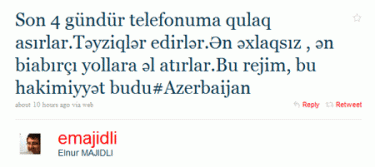
Overall, however, the year was marked by an increasingly mature use of new and especially social media tools. In Armenia, for example, bloggers also reacted on reports that police were targeting teenagers who dressed differently from the norm, while their counterparts in Azerbaijan were concerned, on the basis of individual freedom rather than religious conviction, by the introduction of a ban on the hijab in schools.
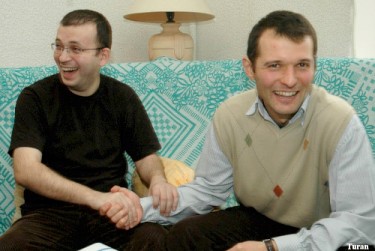
Emin Milli (left) reunited with Adnan Hajizade (right) after their release this week. Photo via @leylanajafli on Twitpic.
But as the year ends with Wikileaks the center of international attention, and even though quite a few headlines centered on cables from the Caucasus, perhaps the most significant event of 2010 was its most positive. Detained and sentenced in Azerbaijan last year, video blogging youth activist Adnan Hajizade was conditionally released from prison in November.
The following day, so too was his friend and associate Emin Milli. The two Amnesty International Prisoners of Conscience later made a video thanking supporters and international organizations who lobbied on their behalf in what most observers considered to be a politically motivated attempt to silence the two men.
Having continuously covered their case since the outset, Global Voices was mentioned alongside others in the credits.
What will happen in 2011 is anybody's guess, but 2010 was certainly marked by the popularity of social networking sites over blogs, especially for activism. Nevertheless, even if increasing, Internet penetration remains low. Examining the number of users on Facebook, now the most popular online social network in the region according to Alexa.com, is perhaps indicative of that.
At time of writing, and according to Facebook's own advertising reach tool, Armenia has 106,500 users on the social networking site, Azerbaijan 276,680, and Georgia 425,540. Whatever does happen, however, you can be sure Global Voices will cover it. In the meantime, its Caucasus section wishes readers Happy Holidays and all the best for 2011.



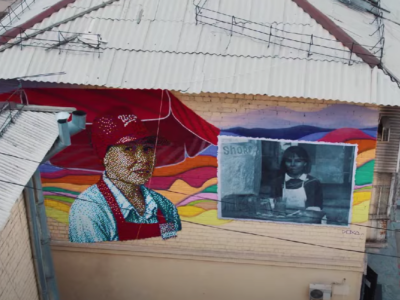



1 comment